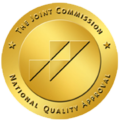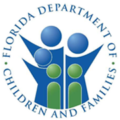HELP US BETTER MEET YOUR NEEDS BY TELLING US A LITTLE MORE ABOUT YOURSELF
Alcohol Detox
Alcohol addiction, also referred to as alcoholism, is such a prominent issue in America because of the fact that almost all Americans over the age of 18 have consumed alcohol at some time in their life. Mainly because alcohol is legal to those over 21 years of age, making it far more available than any other substance.
Alcohol Statistics
Statistics from the National Institute of Alcohol Abuse and Alcoholism (NIAAA), the Centers for Disease Control and Prevention (CDC), and other sources have shown in the past:
- 1/3 emergency room visits is related to consumption of alcohol
- From 2006 to 2010, excessive alcohol consumption was responsible for 1 out of every 10 deaths in adults ages 20-64
- Alcohol is the fourth leading cause of preventable death in America
- Estimated 88,000 people die each year from alcohol-related causes
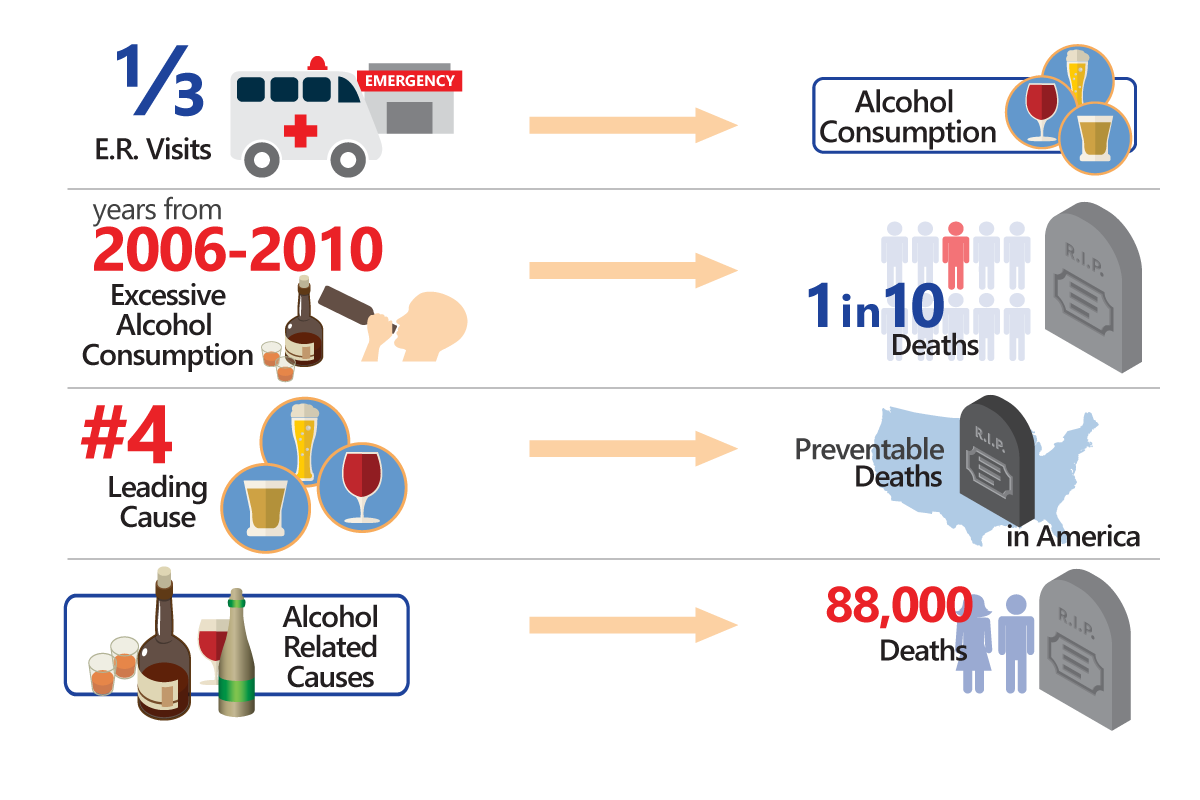
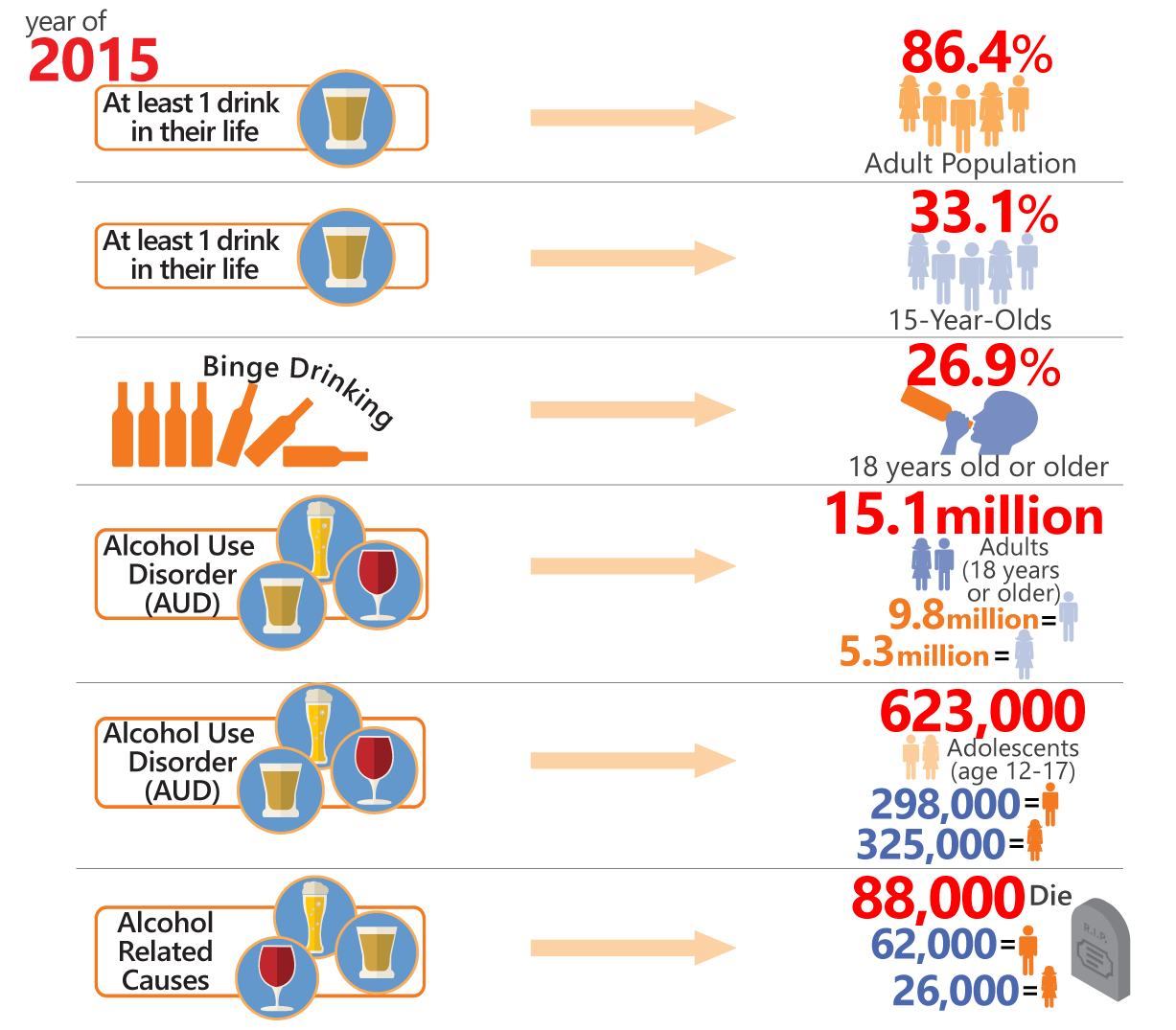
The 2015 National Survey on Drug Use and Health (NSDUH) has shown:
- In 2015 an estimated 86.4% of the adult population (18 years or older) has had at least one drink in their life
- 33.1% of 15-year-olds reported to having at least 1 drink in their life
- 26.9% people age 18 or older admitted to binge-drinking
- 15.1 million adults (18 years or older) had alcohol use disorder (AUD)
-9.8 million men
-5.3 million women
- An estimated 623,000 adolescents (age 12-17) had AUD
-298,000 males
-325,000 females
- Estimated 88,000 (62,0000 men and 26,000 women) die each year from alcohol-related causes
Different Kinds of Alcohol Abuse
Binge Drinking
Binge drinking is often defined as a pattern of excessive consumption of alcohol in a short period of time. SAMHSA and NIAAA have concluded that the typical consumption to be considered binge drinking is around:
- 5 drinks for men within a few hours
- More than 14 drinks a week for men
- 4 drinks for women within a few hours
- More than 7 drinks a week for women
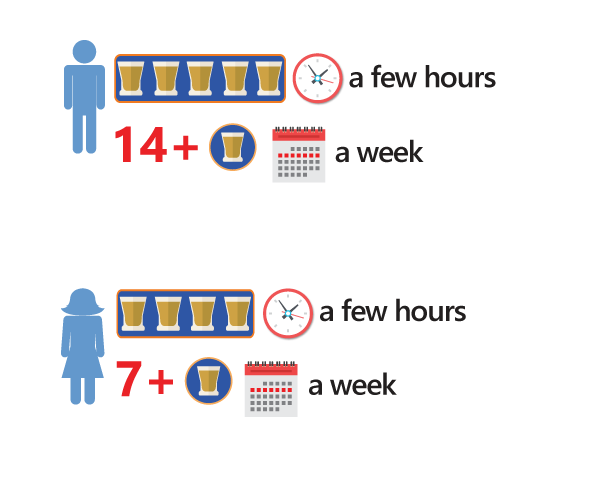

Heavy Alcohol Use
SAMHSA defines heavy alcohol use as binge drinking on 5 or more days in the past month.
While this individual may not be specifically alcoholic, they have an unhealthy drinking habit that can create a great deal of health risks.
Alcohol Use Disorder
Alcohol Use Disorder (AUD) is a medical condition that doctors diagnose when a patient’s drinking causes distress or harm. The American Psychiatric Association published the fourth edition of the Diagnostic and Statistical Manual (DSM–IV), which describes two distinct disorders:
- Alcohol abuse
- Alcohol dependence
However, the fifth edition (DSM–5) integrates the two alcohol disorders, alcohol abuse and alcohol dependence, into a single disorder called alcohol use disorder. Here, AUD is broken into sub-classifications of:
- Mild
- Moderate
- Severe
Each has varying criteria.


Underage Drinking
This is pretty self-explanatory. Alcohol use by anyone under legal drinking age, which is 21 in the United States, is considered underage drinking. While this is not necessarily a sign of addiction, it is a form of alcohol abuse.
Stages of Alcohol Withdrawal
Withdrawal from Alcohol can often start in as short as 6 hours after a drink. The withdrawal symptoms one may experience from alcohol can be very different, depending on factors such as:
- Length of time drinking
- Amounts of alcohol consumed
- Co-occurring mental health disorders
- Medical history
- Stress levels
- History of trauma
The period of withdrawal from alcohol actually can be experienced in stages, with each stage varying in symptoms and intensity. The more dependent on alcohol an individual is, the more likely their symptoms will be severe.
Stage 1 - Mild Symptoms
- Anxiety
- Insomnia
- Nausea
- Abdominal pain
- Vomiting
- Fatigue
- Tremors
- Depression
- Mood swings
- Heart palpitations
Stage 2 - Moderate Symptoms
- Increased blood pressure
- Irregular heart rate
- Increased body temperature
- Mental confusion
- Increased respiration
- Irritability
- Heightened mood disturbances
Stage 3 - Severe Symptoms
- Hallucinations
- Fever
- Severe confusion
- Agitation
Alcohol Withdrawal Delirium Tremens
Delirium tremens (or DTs) is the most severe symptom of alcohol withdrawal. DTs should absolutely be taken seriously because they create sudden and severe problems in the brain and nervous system. This set of complications includes:
- Disorientation, confusion, and severe anxiety
- Stomach pain
- Restlessness
- Delusions
- Nightmares
- Fatigue
- Hallucinations (primarily visual) which cannot be distinguished from reality
- Profuse sweating
- High blood pressure
- Racing and irregular heartbeat
- Severe tremors
- Seizures
Delirium tremens are so severe because they can actually be fatal. This further emphasizes the importance of addressing a long-term drinking issue with a safe, medical detox and not at home. Delirium tremens for people with a history of heavy alcohol use can be brought on by several things, including:
- Sudden stop in drinking
- Reducing alcohol use too quickly
- Don’t eat enough while reducing alcohol
- Head injuries
- Sickness or infection
Alcohol Related Health Conditions
There are numerous other adverse effects and health conditions that often result from frequent, heavy, long-term consumption of alcohol.
- Alcohol-related Liver Disease
This illness actually develops after an extended period of heavy drinking. It causes scarring and cirrhosis on the liver after years of alcohol use. If this condition goes untreated, it can lead to liver cancer and kidney failure.
- Alcohol Neuropathy
This is damage to the nerves from excessive alcohol consumption. It can cause tingling, numbness, painful sensations and muscle problems. This nerve damage is commonly permanent.
- Alcoholic Cardiomyopathy
Long-term use of alcohol frequently leads to heart failure. A heart transplant may actually be needed if the impact of alcoholic cardiomyopathy cannot be reversed.
- Wernicke-Korsakoff Syndrome
This brain disorder is tied to alcoholism that often results in brain damage, some of which is permanent with parts of the brain involved with memory.
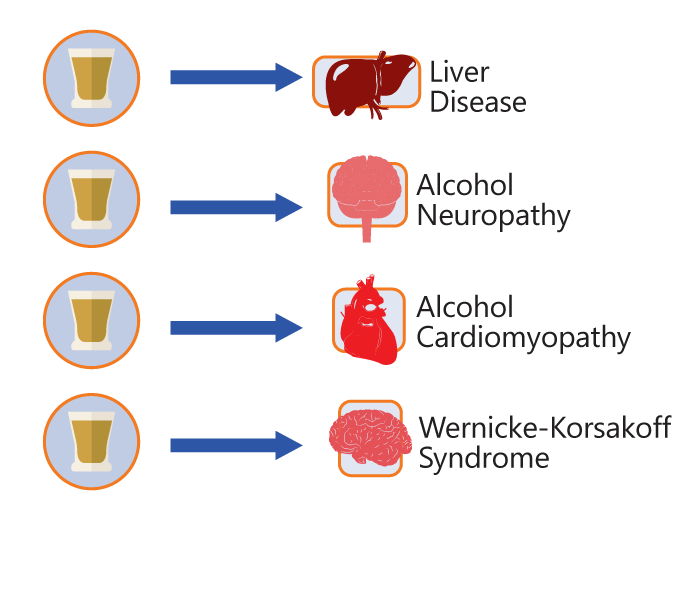
NEED HELP IMMEDIATELY
Call
1-888-934-7256
The Importance of Alcohol Detox
Alcohol detox is so important because it not only provides professional medical support for the various health risks associated with addiction and alcohol use, but it also gives you a safe environment to heal. Alcohol withdrawals can be painfully uncomfortable, even when not fatal. Having a safe medical detox can also help someone struggling with long-term alcohol use to get through this transition period in as much comfort as possible.
In some cases doctors will prescribe medication assistance to help combat withdrawal symptoms, while also monitoring a patient’s progress and helping map out an effective and healthy recovery plan. It is essential that an alcohol addiction treatment program provide many levels of support to those who are trying to make a change.
Palm Healthcare Company
1177 George Bush Blvd.
Delray Beach, FL 33483
888-934-7256
Joint Commission accreditation and certification is recognized nationwide as a symbol of quality that reflects an organization’s commitment to meeting certain performance standards.
